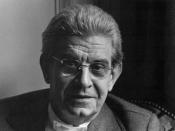Bill Clinton's early childhood did not show many signs of him one day becoming president of the United States. He was from a small town family which was not the usual rich family that is needed to produce a president. The only things that may suggest his drive to become president are the thoughts implanted in his superego(Sdorow, 1995) by the troubles of an alcoholic step-father and the usual troubles of daily life that children must deal with.
Clinton's reputation as a do-gooder and peace keeper may have come from a repressed defense mechanism(Sdorow, 1995) such as displacement(Sdorow, 1995). When Clinton was young and his step-father, who was an alcoholic and sometimes abusive, he may have felt an urgency to help his mother but found himself to small to do so. Later on in life this defense mechanism of displacement may have unconsciously driven him to want to help others.
His Rose Garden meeting with Kennedy and his repressed feelings through displacement are probably the main catalysts in Clinton's desire to become president. He may have realized that being the president would enable him to help people which is what he was driven to do by wanting to help his mother.
We can speculate that his alleged womanizing was most likely connected in some way to his early childhood Oedipus Complex(Sdorow, 1995). As Freud would say that all children are attracted to the opposite sex parent we can say in a Freudian perspective that Clinton was attracted to his mother. His alcoholic step-father's occasional tears of violence may have increased his fear of punishment from the same sex parent. This increased fear of punishment may of initiated a greater attraction to other women later on in his life.
We can also speculate that his decision of playing the saxophone was...


